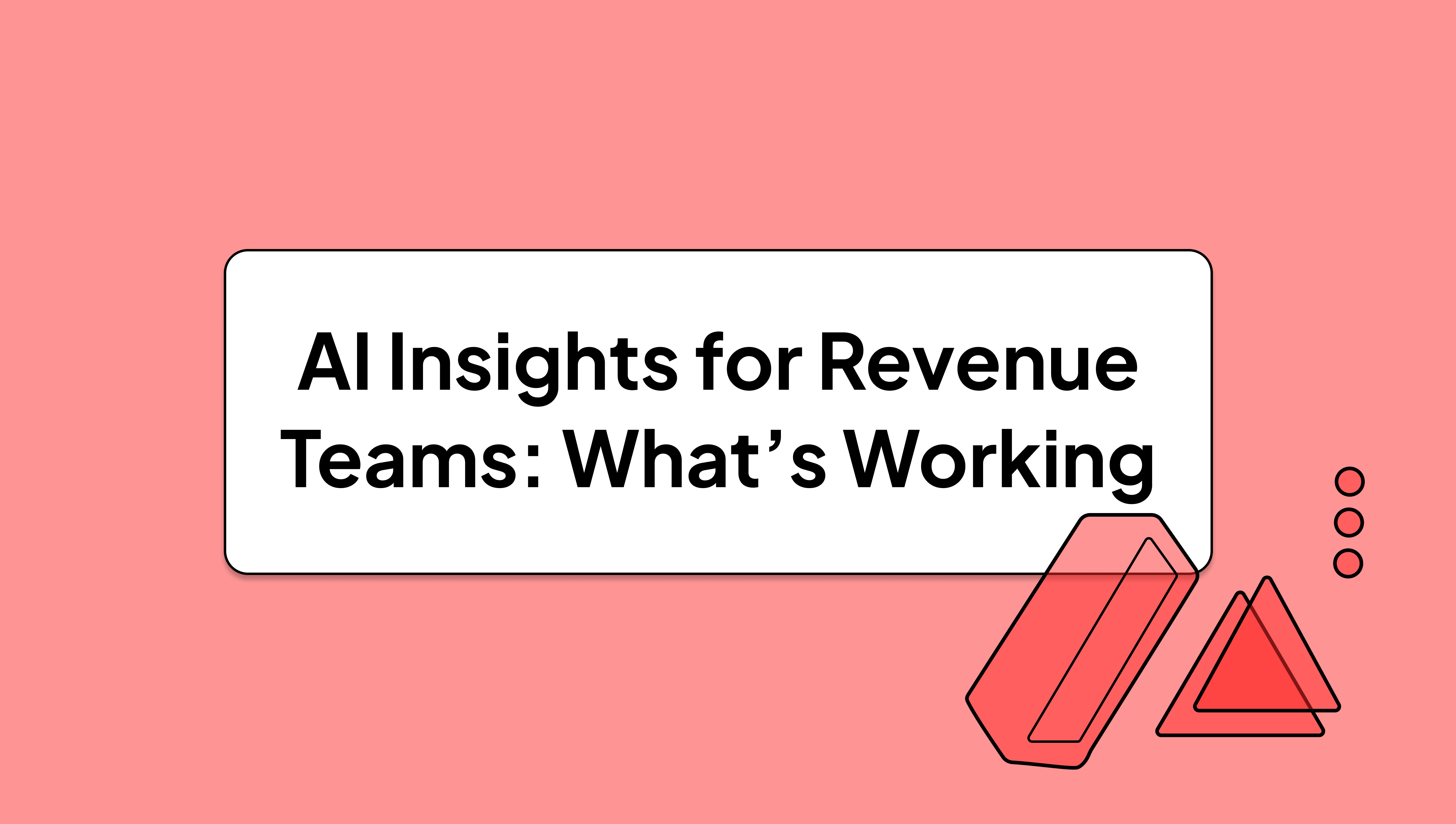In today's rapidly evolving business ecosystem, revenue teams are under pressure to not only meet but exceed their targets. Leveraging AI insights for revenue teams has emerged as a crucial strategy to enhance decision-making and optimize performance. AI technologies can analyze vast datasets at unprecedented speeds, enabling teams to glean valuable insights that were previously unattainable. This article explores what's working in the realm of AI insights for revenue teams, providing actionable strategies and real-world examples that can help you harness this technology effectively.
The adoption of AI insights is not merely a trend; it is a necessity for revenue teams aiming to maintain a competitive edge. According to a report from McKinsey, businesses that effectively utilize AI can increase their cash flow by up to 15%, highlighting the profound impact of data-driven strategies on revenue generation. As the landscape becomes more competitive, understanding how to implement AI insights effectively is crucial for success.
Understanding AI Insights and Their Importance
AI insights refer to the actionable information derived from data analysis using artificial intelligence technologies. These insights can range from predictive analytics that forecast future sales trends to customer segmentation that enhances targeting strategies. For revenue teams, understanding these insights allows for a more nuanced approach to strategy development and execution. By leveraging AI, teams can minimize guesswork and base their decisions on data-backed evidence rather than intuition alone.
One of the most significant advantages of AI insights is their ability to process and analyze large volumes of data quickly. For instance, the implementation of AI-driven analytics platforms can help revenue teams gain insights into customer behavior patterns, enabling them to tailor their sales strategies accordingly. A case study from Salesforce found that organizations utilizing AI for revenue management saw a 60% increase in lead conversion rates. This statistic underscores the importance of integrating AI insights into everyday practices.
How Can AI Insights Improve Revenue Strategies?
AI insights can drive improvements in several critical areas, including sales forecasting, lead scoring, and customer relationship management. By analyzing historical data, AI tools can generate accurate sales forecasts, allowing teams to allocate resources more effectively. For example, a leading SaaS company employed AI algorithms to analyze customer behavior and predict churn rates, which led to a targeted re-engagement campaign that reduced churn by 25%. This highlights how AI can transform the way revenue teams approach their strategies.
Moreover, AI can enhance lead scoring processes by identifying which leads are most likely to convert. Utilizing machine learning algorithms, revenue teams can prioritize high-potential leads and tailor their outreach efforts accordingly. As a result, sales representatives can focus their time and resources on leads that are more likely to yield results, ultimately improving productivity and sales outcomes. The effectiveness of these AI-driven strategies emphasizes the need for revenue teams to adopt advanced technologies in their operational frameworks.
Integrating AI Tools into Revenue Teams
Integrating AI tools into revenue teams requires careful planning and execution. The first step is to identify the right tools that align with the team's specific goals. Numerous AI-powered platforms are available, from customer relationship management (CRM) systems with integrated analytics to dedicated AI solutions that specialize in sales forecasting and lead scoring. Teams should evaluate their current processes and identify gaps where AI can add value.
Additionally, training and support are critical for successful integration. Revenue teams need to be equipped with the knowledge and skills to leverage AI tools effectively. Providing training sessions and resources will empower team members to utilize AI insights confidently. For instance, HubSpot offers comprehensive training on using their AI features, ensuring that teams can maximize the benefits of the technology at their disposal.
What Are the Challenges of Implementing AI Insights?
While the benefits of AI insights for revenue teams are substantial, there are challenges to consider. One common hurdle is the quality of data. AI technologies rely on accurate and clean data to generate meaningful insights. If the data fed into AI systems is flawed or incomplete, the resulting insights can lead to misguided strategies. Therefore, it is essential for revenue teams to establish robust data management practices before implementing AI solutions.
Another challenge is the potential resistance to change within the team. As with any new technology, there may be apprehension about adopting AI-based strategies. To address this, leaders should communicate the benefits clearly and demonstrate how AI insights can enhance workflow and productivity. By fostering a culture of openness and adaptability, revenue teams can mitigate resistance and embrace AI as a valuable ally in their quest for success.
Case Studies: Success Stories of AI in Revenue Teams
Real-world examples can provide powerful insights into how AI is transforming revenue teams across various industries. For instance, Netflix utilizes AI algorithms to analyze viewer habits and preferences, which informs their content recommendations and marketing strategies. This data-driven approach has not only improved customer satisfaction but has also significantly increased subscriber retention rates.
Another compelling example is IBM, which leverages AI to enhance its sales performance. The company implemented an AI-driven platform that analyzes sales data and customer interactions, providing insights that help sales teams tailor their approach. As a result, IBM reported a 30% increase in sales productivity, showcasing the transformative power of AI insights in driving revenue growth.
How Can Revenue Teams Start Using AI Insights?
Getting started with AI insights requires a structured approach. Revenue teams should begin by assessing their current data capabilities and identifying areas where AI can provide the most value. This could involve piloting AI tools on a small scale to gauge effectiveness before a full rollout. Additionally, teams should focus on fostering a culture of data-driven decision-making, encouraging members to utilize insights from AI in their daily workflows. For teams uncertain about where to begin, seeking guidance from industry experts or investing in training programs can accelerate the learning curve and ensure a smoother implementation process.
Ready to transform your revenue strategies with AI insights? Start exploring the latest AI tools that can revolutionize your approach and drive growth today!Conclusion: Embracing the Future of Revenue Teams
The integration of AI insights for revenue teams is not just a trend; it represents a fundamental shift in how teams approach strategy and decision-making. By leveraging AI technologies, revenue teams can enhance their predictive capabilities, improve lead conversion rates, and ultimately drive revenue growth. As the business landscape continues to evolve, embracing AI will be crucial for teams looking to stay ahead of the competition. It is time for revenue teams to harness the power of AI insights and unlock their full potential.


.png)



